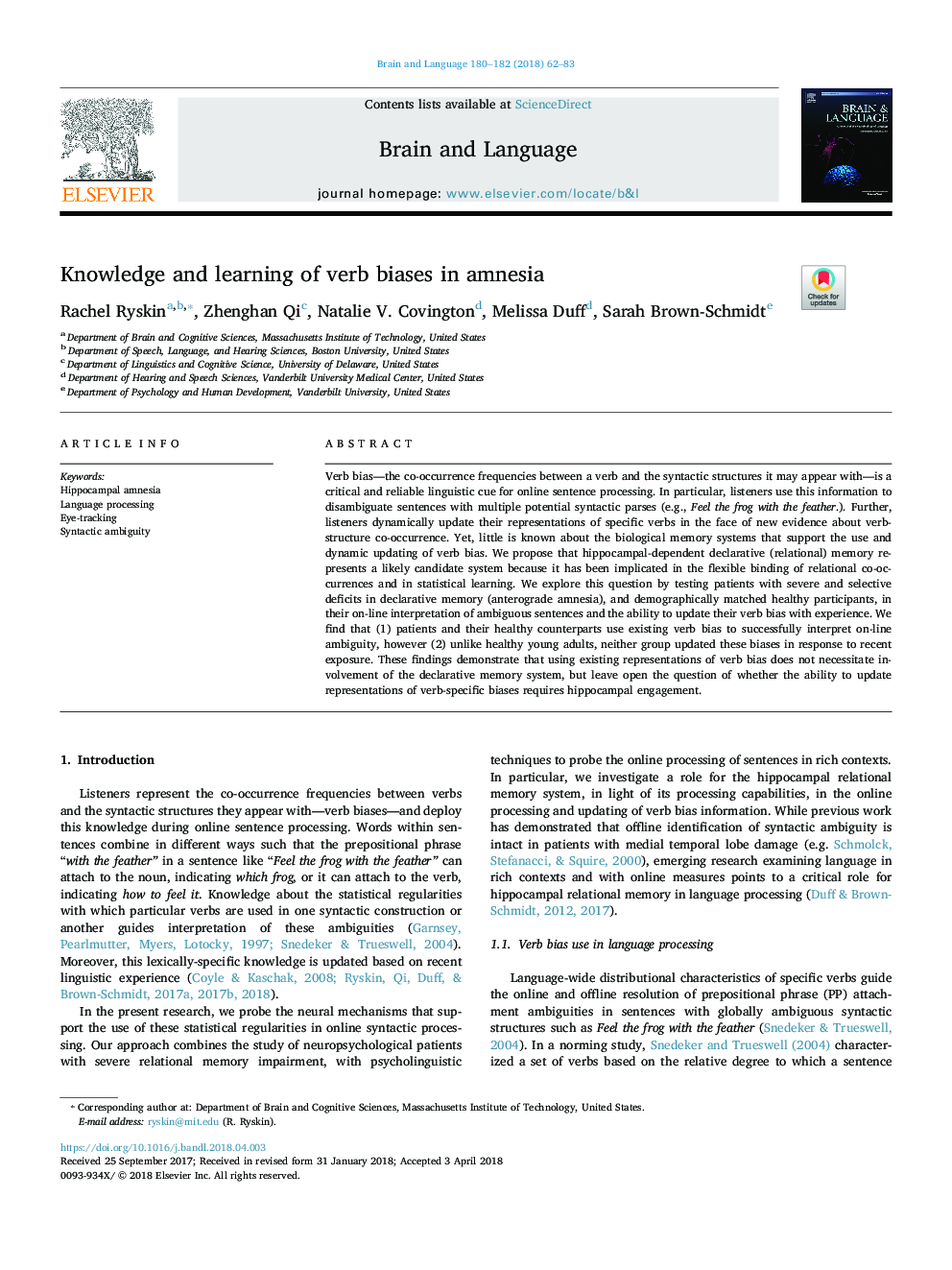| کد مقاله | کد نشریه | سال انتشار | مقاله انگلیسی | نسخه تمام متن |
|---|---|---|---|---|
| 7283483 | 1474005 | 2018 | 22 صفحه PDF | دانلود رایگان |
عنوان انگلیسی مقاله ISI
Knowledge and learning of verb biases in amnesia
ترجمه فارسی عنوان
دانش و یادگیری تعصبات فعل در آمنیازیایی
دانلود مقاله + سفارش ترجمه
دانلود مقاله ISI انگلیسی
رایگان برای ایرانیان
کلمات کلیدی
ترجمه چکیده
تعصب فعلی - فرکانس های همپوشانی بین یک فعل و ساختارهای نحوی که ممکن است با آن ظاهر شود، یک نشانه زبانشناختی و قابل اعتماد برای پردازش جمله آنلاین است. به طور خاص، شنوندگان از این اطلاعات به جملات متضاد با چندین اصطلاح تقریبی همگانی استفاده می کنند (به عنوان مثال، قورباغه را با پر کنید). علاوه بر این، شنوندگان به طور پویا تجدید نظر خود را از افعال خاص در برابر شواهد جدید در مورد همبستگی ساختار فعل. با این حال، در مورد سیستم های حافظه ی بیولوژیکی که از استفاده و به روز رسانی دینامیکی افسردگی فعلی پشتیبانی می کنند، کم است. ما پیشنهاد می کنیم که حافظه توصیفی (ارتباطی) وابسته به هیپوکامپ، یک سیستم کاندیدای احتمالی را نشان می دهد، زیرا در پیوند انعطاف پذیری از همپوشانی های ارتباطی و یادگیری آماری، دخالت دارد. ما این سوال را با آزمایش بیماران مبتلا به نقص شدید و انتخابی در حافظه توصیفی (آمونیاسیون آنترآغاد) بررسی می کنیم و از لحاظ جمعیت شناختی شرکت کنندگان سالم را در تفسیر مستقیم مضامین جملاتی مبهم و توانایی تغییر افعال فعل آنها با تجربه تجربه می کنیم. ما دریافتیم که (1) بیماران و همتایان سالم خود را از تعصب افعال موجود برای موفقیت تفسیر بر روی ابهام در سطحی استفاده می کنند، با این حال (2) بر خلاف بزرگسالان سالم جوان، هیچ یک از این گروه ها، این پاسخ ها را در معرض قرار گرفتن در معرض اخیر قرار ندادند. این یافته ها نشان می دهد که استفاده از بازنمودهای فعلی تعصب افعال، دخالت سیستم حافظه توصیفی را ضروری نمی کند، اما سوال را مطرح می کند که آیا توانایی برای به روز رسانی بازنمودها از تعصبات خاص به عمل می آورد یا خیر.
موضوعات مرتبط
علوم زیستی و بیوفناوری
علم عصب شناسی
روانپزشکی بیولوژیکی
چکیده انگلیسی
Verb bias-the co-occurrence frequencies between a verb and the syntactic structures it may appear with-is a critical and reliable linguistic cue for online sentence processing. In particular, listeners use this information to disambiguate sentences with multiple potential syntactic parses (e.g., Feel the frog with the feather.). Further, listeners dynamically update their representations of specific verbs in the face of new evidence about verb-structure co-occurrence. Yet, little is known about the biological memory systems that support the use and dynamic updating of verb bias. We propose that hippocampal-dependent declarative (relational) memory represents a likely candidate system because it has been implicated in the flexible binding of relational co-occurrences and in statistical learning. We explore this question by testing patients with severe and selective deficits in declarative memory (anterograde amnesia), and demographically matched healthy participants, in their on-line interpretation of ambiguous sentences and the ability to update their verb bias with experience. We find that (1) patients and their healthy counterparts use existing verb bias to successfully interpret on-line ambiguity, however (2) unlike healthy young adults, neither group updated these biases in response to recent exposure. These findings demonstrate that using existing representations of verb bias does not necessitate involvement of the declarative memory system, but leave open the question of whether the ability to update representations of verb-specific biases requires hippocampal engagement.
ناشر
Database: Elsevier - ScienceDirect (ساینس دایرکت)
Journal: Brain and Language - Volumes 180â182, MayâJuly 2018, Pages 62-83
Journal: Brain and Language - Volumes 180â182, MayâJuly 2018, Pages 62-83
نویسندگان
Rachel Ryskin, Zhenghan Qi, Natalie V. Covington, Melissa Duff, Sarah Brown-Schmidt,
